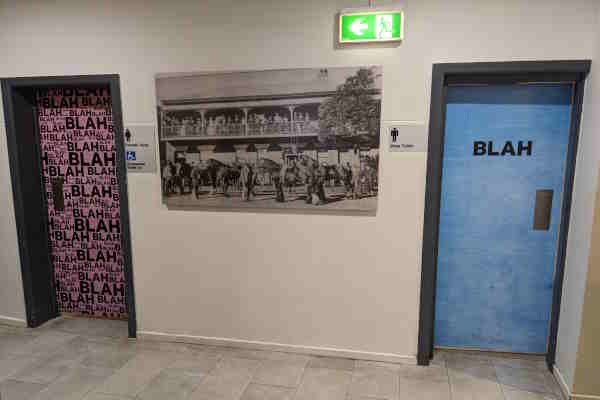Gift of the gab
By Greg Spearritt
This decoration of doors in a local Toowoomba pub is presumably intended to be funny. It’s an odd look, not to say disturbing, in the era of #MeToo. Can something be funny and seriously untrue?
An analysis of dialogue in films – at least regarding Hollywood movies – shows that men speak more than twice as often as women. Even when a woman is the lead actor (e.g. Pretty Woman) the overall dialogue is still more than 50% male.
Fewer than half of the 1200 most popular movies, according to the scientific journal Psychology of Popular Media, pass the Bechdel Test: that is, they feature (i) at least two women (ii) who talk to each other (iii) about something other than a man. Over 95% of these movies feature the reverse (at least two named men who talk to each other about something besides a woman).
All this, of course, in a society where women have the vote and can legally have control over their own lives and finances.
Fiction, too, shows this bias. In works of literature, men outnumber women four to one.
Anna Funder’s latest book Wifedom shows the staggering extent to which George Orwell’s wife is almost completely written out of his life in his own accounts, despite saving his life and substantially enabling his career. Patriarchy, she observes,
is a fiction in which all the main characters are male and the world is seen from their point of view. (Penguin, 2023, p.60).
It gets truly serious, of course, when the health and safety of women is considered. It is well established that intimate partner violence often results in women’s silence, as a coping mechanism, to protect themselves or their children. In the UK, domestic violence is endured by women on average for over two years before they seek useful help. The Australian statistics show the risks of speaking out or taking action: on average, one woman a week is murdered by her current or former partner.
A woman’s failure to speak out about a sexual assault, or to report it in a timely way, has been used time and again by defence barristers in rape trials to cast doubt on their testimony. Yet the evidence shows they are often punished for speaking out, being subjected to negative reactions from support providers. And the results of speaking out, in terms of successful convictions, are woeful: just one in ten. Certainly the repercussions for a woman’s career can be considerable, as we know from accounts in the entertainment, legal and other communities.
Harassment online, according to a 2021 study, does not occur more frequently to women than to men, except for high-profile women: bucking the conventions by refusing to be silent and by exercising a degree of power does indeed make women more exposed to it. Even among the general population, however, as this study shows, harassment aimed at women is more about their gender (who they are), whereas against men it’s more about their opinions (what they think).
The pub with the dubiously decorated doors must have seen its share of pre-wedding rituals. The language we use for these reinforces the stereotypes: ‘stags’ and ‘bucks’ suggest the strong, silent type; ‘hens’ implies empty-headed cackling.
Clearly, however, it’s men, not women, who are given the gift of the gab – not by God, but by a persistently patriarchal society. And it’s no joke.
Disclaimer: views represented in SOFiA articles are entirely the view of the respective authors and in no way represent an official SOFiA position. They are intended to stimulate thought, rather than present a final word on any topic.
Photo by Greg Spearritt


